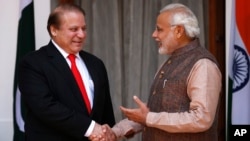NEW DELHI —
Indian Prime Minister Narendra Modi has urged his Pakistani counterpart Nawaz Sharif to crack down on militancy during their talks in New Delhi.
The two leaders have held a landmark meeting in New Delhi, marking a thaw in their frosty ties. India has called on Pakistan to meet its commitment of cracking down on Islamic militants as the Pakistani leader expressed optimism about the prospect of peace.
Sharif spoke with hope following a meeting with his Indian counterpart Modi in New Delhi Tuesday.
Sharif said the two countries' common agenda of development and economic revival cannot be achieved unless there is peace in the region. He said he told the Indian prime minister that “together we should rid the region of instability and insecurity.”
“I urged that we had to strive to change confrontation into cooperation. Engaging in accusations and counter-accusations would be counter-productive, I emphasized. My government therefore stands ready to discuss all issues between our two countries in a spirit of cooperation. After all, we owe it to our people to overcome the legacy of mistrust and misgivings,” he said.
The two leaders met a day after Sharif came to the Indian capital following an unexpected invitation to all South Asian leaders to attend the swearing-in ceremony of the new Indian prime minister.
Modi and Sharif shook hands warmly and their meeting extended well beyond the scheduled half hour.
India says the core concern that has prevented the two countries from moving ahead is, in India's view, Pakistan’s failure to clamp down on Islamic militant groups which New Delhi blames for terror strikes in India. The worst attack took place in Mumbai in 2008, killing more than 160 people. India has complained about postponements and delays in the trial of the suspects.
“It was conveyed that Pakistan must abide by its commitment to prevent its territory and territory under its control for being used for terrorism against India," said Sujatha Singh, India’s foreign secretary. "We also expect necessary steps will be taken in the Mumbai terror attack trial under way in Pakistan to ensure speedy progress of the case,” she said.
Modi told his counterpart that the two countries could immediately move to normalizing trade relations which have been held hostage to their political differences.
For the time being, the two countries appear to have broken the ice. Officials said the foreign secretaries of the two countries will be meeting soon to discuss “how to move the relationship forward."
Sharif sounded optimistic that the clear mandate which both leaders have could help in turning a new page in their relations.
Although Tuesday’s meeting was a milestone, political analysts say it is too early to say how talks between the two countries will progress. However, they say Modi’s initiative in calling the Pakistani leader, and Sharif’s decision to come to New Delhi, show that both sides are willing to break the deadlock. The two rivals, who have fought three wars, have not held official talks for nearly two years.
The two leaders have held a landmark meeting in New Delhi, marking a thaw in their frosty ties. India has called on Pakistan to meet its commitment of cracking down on Islamic militants as the Pakistani leader expressed optimism about the prospect of peace.
Sharif spoke with hope following a meeting with his Indian counterpart Modi in New Delhi Tuesday.
Sharif said the two countries' common agenda of development and economic revival cannot be achieved unless there is peace in the region. He said he told the Indian prime minister that “together we should rid the region of instability and insecurity.”
“I urged that we had to strive to change confrontation into cooperation. Engaging in accusations and counter-accusations would be counter-productive, I emphasized. My government therefore stands ready to discuss all issues between our two countries in a spirit of cooperation. After all, we owe it to our people to overcome the legacy of mistrust and misgivings,” he said.
The two leaders met a day after Sharif came to the Indian capital following an unexpected invitation to all South Asian leaders to attend the swearing-in ceremony of the new Indian prime minister.
Modi and Sharif shook hands warmly and their meeting extended well beyond the scheduled half hour.
India says the core concern that has prevented the two countries from moving ahead is, in India's view, Pakistan’s failure to clamp down on Islamic militant groups which New Delhi blames for terror strikes in India. The worst attack took place in Mumbai in 2008, killing more than 160 people. India has complained about postponements and delays in the trial of the suspects.
“It was conveyed that Pakistan must abide by its commitment to prevent its territory and territory under its control for being used for terrorism against India," said Sujatha Singh, India’s foreign secretary. "We also expect necessary steps will be taken in the Mumbai terror attack trial under way in Pakistan to ensure speedy progress of the case,” she said.
Modi told his counterpart that the two countries could immediately move to normalizing trade relations which have been held hostage to their political differences.
For the time being, the two countries appear to have broken the ice. Officials said the foreign secretaries of the two countries will be meeting soon to discuss “how to move the relationship forward."
Sharif sounded optimistic that the clear mandate which both leaders have could help in turning a new page in their relations.
Although Tuesday’s meeting was a milestone, political analysts say it is too early to say how talks between the two countries will progress. However, they say Modi’s initiative in calling the Pakistani leader, and Sharif’s decision to come to New Delhi, show that both sides are willing to break the deadlock. The two rivals, who have fought three wars, have not held official talks for nearly two years.





